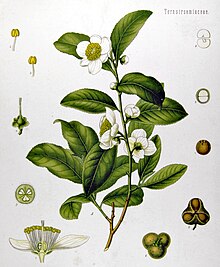Sinecatechins

Sinecatechins (USAN, trade names Veregen and Polyphenon E) is a specific water extract of green tea leaves from Camellia sinensis that is the active ingredient in an ointment approved by the FDA in 2006 as a botanical drug to treat genital warts.[1][2][3] Sinecatechins are mostly catechins, 55% of which is epigallocatechin gallate.[4] It was the first botanical drug approved by the US FDA.[2]
The mechanism of action of sinecatechins is undetermined. In its use for treatment of genital warts caused by the human papilloma virus, sinecatechins appear to have higher clearance rates than podophyllotoxin or imiquimod and causes less local irritation. However, clearance of lesions takes longer than with imiquimod.[5]
References
- ^ "Veregen label information" (PDF). Retrieved 2015-05-02.
- ^ a b Masters KP New Drug Reviews: Sinecatechins (Veregen) for External Genital and Perianal Warts. Am Fam Physician. 2009 Dec 15;80(12):1447-1454.
- ^ Fürst R, Zündorf I Plant-derived anti-inflammatory compounds: hopes and disappointments regarding the translation of preclinical knowledge into clinical progress. Mediators Inflamm. 2014;2014:146832. doi:10.1155/2014/146832. PMID 24987194 PMC 4060065
- ^ Mayeaux EJ, Dunton C (July 2008). "Modern management of external genital warts". J Low Genit Tract Dis. 12 (3): 185–192. doi:10.1097/LGT.0b013e31815dd4b4. PMID 18596459.
- ^ Meltzer SM, Monk BJ, Tewari KS (March 2009). "Green tea catechins for treatment of external genital warts" (PDF). Am. J. Obstet. Gynecol. 200 (3): 233.e1–7. doi:10.1016/j.ajog.2008.07.064. PMID 19019336.
